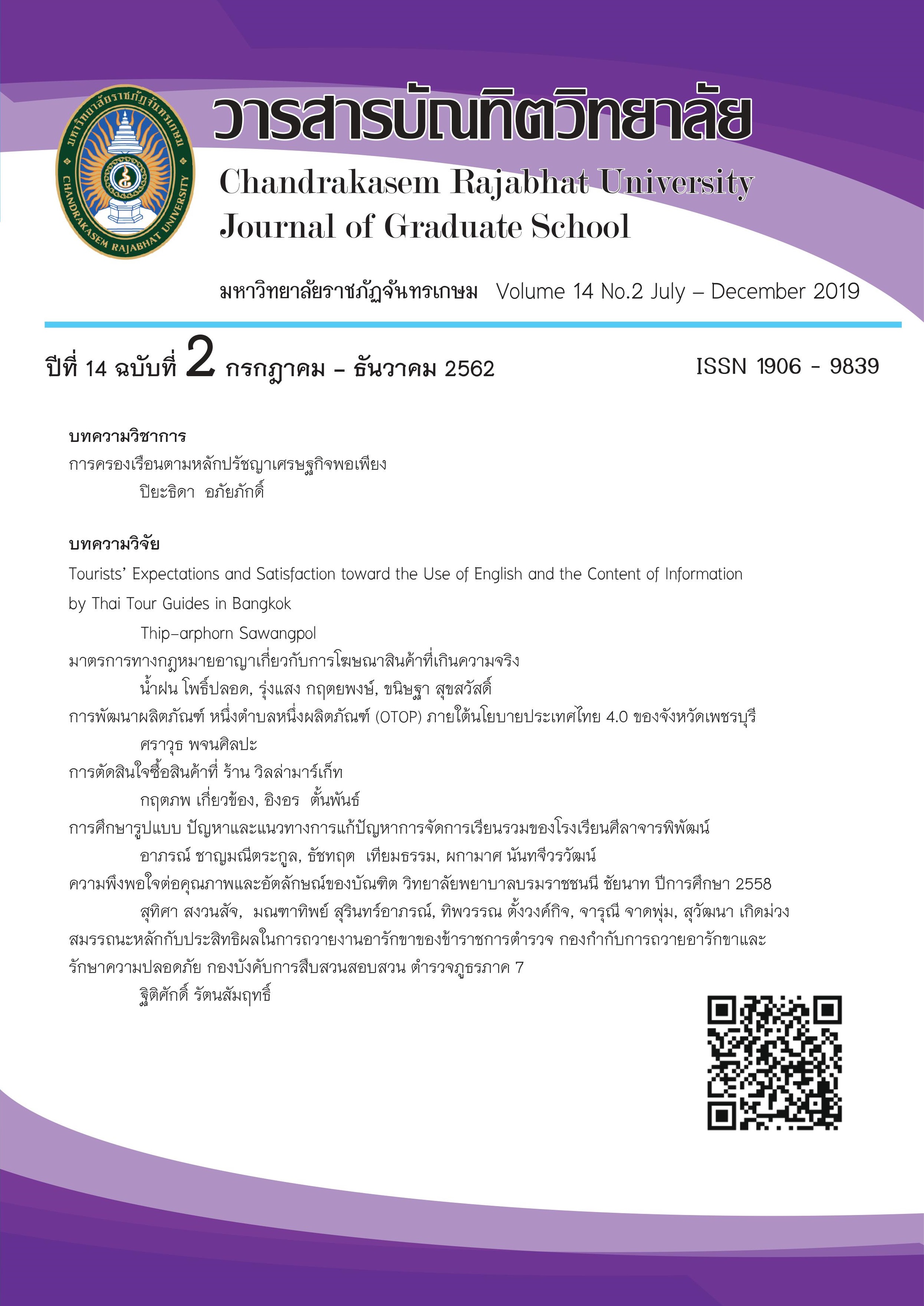Wedlock According to Sufficiency Economy Philosophy
Main Article Content
Abstract
’Sufficiency Economy Philosophy’ (SEP) is the philosophy given by His Majesty King Bhumibol Adulyadej (King Rama IX) to Thai people for more than 30 years in order to apply the philosophy to live their lives. SEP is aimed to be the basis for following or adopting the middle path of living the life consists of 3 components (Moderation : the sense of not too much or not too little, Reasonableness: the choices we make be justifiable by using academic approaches, legal principles, moral values or social norms, and Self-immunity : emphasizing the need for built-in resilience against the risks which arise from internal and external changes by having good risk management) and 2 conditions (Knowledge: wisdom, carefulness, and caution, and Morality : honesty, diligence, and tolerance). These 3 components and 2 conditions can lead the pursuers to the possible state of better living: economy, society, environment, and culture in the means of balance, stability, and sustainability.
Life planning is a preparation for the direction set ahead before moving forward. It is a kind of planning that takes information into the consideration about what to do, how to do, and when to do concerning life in the future after the marriage. The wedlock with ‘sufficient being’ is considered to be the well planned one by inducing SEP. Buddhism virtues for lay people to have a good household life called Karavas Dhama — including Sacca : truth and honesty, Dama : taming and training oneself, Khant i: tolerance, forbearance, and perseverance, and Caga : liberality and generosity — should be implemented for better marriage life. It can be such an example of living a happy wedding life for other people.
Article Details
References
ก่อ สวัสดิพานิชย์. (2519). ความสัมพันธ์ในการครองเรือน. กรุงเทพฯ: สำนักพิมพ์วัฒนาพานิช จำกัด.
จำเนียร รักษาภักดี. (2544). จริยธรรมของคู่สมรสตามหลักพระพุทธศาสนา (วิทยานิพนธ์ปริญญามหาบัณฑิต). กรุงเทพฯ: มหาวิทยาลัยธรรมศาสตร์.
ณดา จันทร์สม และ ณัฏฐพงศ์ ทองภักดี. (2555). คุณธรรมตามหลักปรัชญาของเศรษฐกิจพอเพียง รายงานการวิจัยทุนสนับสนุนจากศูนย์ศึกษาพัฒนาการเศรษฐกิจ สถาบันบัณฑิตพัฒนบริหารศาสตร์. กรุงเทพฯ: สถาบันบัณฑิตพัฒนบริหารศาสตร์.
นัทปราชญ์ นันทิวัฒน์กูล และสุภิญญา อนุกานนท์. (2551). การประยุกต์ใช้ปรัชญาเศรษฐกิจพอเพียงในกลุ่มวัยรุ่น. ปทุมธานี: มหาวิทยาลัยเทคโนโลยีราชมงคลธัญบุรี.
ประเวศ วะสี. (2542). เศรษฐกิจพอเพียงและประชาสังคมแนวทางพลิกฟื้นเศรษฐกิจสังคม. กรุงเทพฯ: หมอชาวบ้าน.
พระธรรมปิฎก. (ป.อ. ปยุตโต). (2537). ชีวิตที่สมบูรณ์ (พิมพ์ครั้งที่ 2). กรุงเทพฯ: บริษัท สหธรรมมิก จำกัด.
พระธรรมปิฎก. (ป.อ. ปยุตโต). (2542). ธรรมกับไทยในสถานการณ์ปัจจุบัน (พิมพ์ครั้งที่ 5). กรุงเทพฯ: กองทุนวุฒิธรรมเพื่อการศึกษาและปฏิบัติธรรม.
พระมหาบุญเพียร ปุญญวิริโย. (2544). แนวคิดและวิธีการขัดเกลาทางสังคมในสถาบันครอบครัวตามแนวพระพุทธศาสนา (วิทยานิพนธ์ปริญญามหาบัณฑิต). กรุงเทพฯ: มหาวิทยาลัยมหาจุฬาลงกรราชวิทยาลัย.
วิรัช วิรัชนิภาวรรณ. (2550). การบริหารจัดการตามแนวทางคุณธรรมและแนวทางเศรษฐกิจพอเพียง. กรุงเทพฯ: โพร์เพซ.
สุเมธ ตันติเวชกุล. (2544). เศรษฐกิจพอเพียงตามแนวพระราชดำริ. กรุงเทพฯ: มติชน.
สุนทร กุลวัฒนวรพงศ์. ( 2544). ตามรอยพระราชดำริเศรษฐกิจพอเพียง-ทฤษฎีใหม่. กรุงเทพฯ: ชมรม.
โสภณ สุภาพงษ์. (2547). โสภณ สุภาพงษ์ เลมอนฟาร์ม เส้นทางการเกื้อกูลตามแนวเศรษฐกิจพอเพียง. กรุงเทพฯ: สกุลไทย.
สุลักษณ์ ศิวรักษ์. (2525). ศาสนากับสังคมไทย. กรุงเทพฯ: บริษัท พลพันธ์การพิมพ์ จำกัด.
Tammemagi. H. (1999). The Waste Crisis. London: Oxford University Press.

